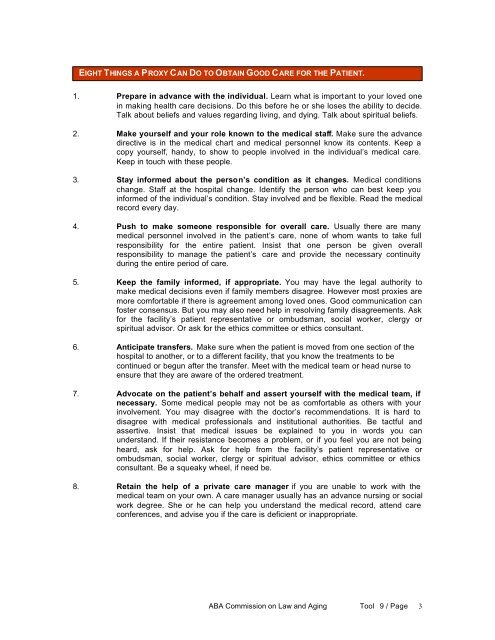Consumer's Tool Kit for Health Care Advance Planning
Consumer's Tool Kit for Health Care Advance Planning
Consumer's Tool Kit for Health Care Advance Planning
You also want an ePaper? Increase the reach of your titles
YUMPU automatically turns print PDFs into web optimized ePapers that Google loves.
EIGHT THINGS A PROXY CAN DO TO OBTAIN GOOD CARE FOR THE PATIENT.<br />
1. Prepare in advance with the individual. Learn what is important to your loved one<br />
in making health care decisions. Do this be<strong>for</strong>e he or she loses the ability to decide.<br />
Talk about beliefs and values regarding living, and dying. Talk about spiritual beliefs.<br />
2. Make yourself and your role known to the medical staff. Make sure the advance<br />
directive is in the medical chart and medical personnel know its contents. Keep a<br />
copy yourself, handy, to show to people involved in the individual’s medical care.<br />
Keep in touch with these people.<br />
3. Stay in<strong>for</strong>med about the person’s condition as it changes. Medical conditions<br />
change. Staff at the hospital change. Identify the person who can best keep you<br />
in<strong>for</strong>med of the individual’s condition. Stay involved and be flexible. Read the medical<br />
record every day.<br />
4. Push to make someone responsible <strong>for</strong> overall care. Usually there are many<br />
medical personnel involved in the patient’s care, none of whom wants to take full<br />
responsibility <strong>for</strong> the entire patient. Insist that one person be given overall<br />
responsibility to manage the patient’s care and provide the necessary continuity<br />
during the entire period of care.<br />
5. Keep the family in<strong>for</strong>med, if appropriate. You may have the legal authority to<br />
make medical decisions even if family members disagree. However most proxies are<br />
more com<strong>for</strong>table if there is agreement among loved ones. Good communication can<br />
foster consensus. But you may also need help in resolving family disagreements. Ask<br />
<strong>for</strong> the facility’s patient representative or ombudsman, social worker, clergy or<br />
spiritual advisor. Or ask <strong>for</strong> the ethics committee or ethics consultant.<br />
6. Anticipate transfers. Make sure when the patient is moved from one section of the<br />
hospital to another, or to a different facility, that you know the treatments to be<br />
continued or begun after the transfer. Meet with the medical team or head nurse to<br />
ensure that they are aware of the ordered treatment.<br />
7. Advocate on the patient’s behalf and assert yourself with the medical team, if<br />
necessary. Some medical people may not be as com<strong>for</strong>table as others with your<br />
involvement. You may disagree with the doctor’s recommendations. It is hard to<br />
disagree with medical professionals and institutional authorities. Be tactful and<br />
assertive. Insist that medical issues be explained to you in words you can<br />
understand. If their resistance becomes a problem, or if you feel you are not being<br />
heard, ask <strong>for</strong> help. Ask <strong>for</strong> help from the facility’s patient representative or<br />
ombudsman, social worker, clergy or spiritual advisor, ethics committee or ethics<br />
consultant. Be a squeaky wheel, if need be.<br />
8. Retain the help of a private care manager if you are unable to work with the<br />
medical team on your own. A care manager usually has an advance nursing or social<br />
work degree. She or he can help you understand the medical record, attend care<br />
conferences, and advise you if the care is deficient or inappropriate.<br />
ABA Commission on Law and Aging <strong>Tool</strong> 9 / Page 3
















